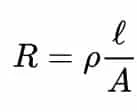Understanding the differences between resistance and resistivity is very important as they are closely related. This article aims to bring you clarity on resistance and resistivity by comparing each of their properties, definitions and formula.
Introduction
Every object posses some amount of opposition to the flow of electric current. If the object is a conductor, this opposition results in energy loss occurs in the form of heat within them. The property of any object to oppose electric current is known as resistance. The term resistivity is used to quantify resistance. Here are a few key differences between resistance and resistivity. Let’s begin with their definitions.
Definition of resistivity
Electrical resistivity is defined as the measure of opposition of unit volume of an object to electric current flow. To understand this definition better, assume that we have a solid cube of copper with us and we measure resistance between any two opposite faces of the cube using an ohm-meter. Then resistance indicated by the ohm-meter is known as electrical resistivity of copper. The formula of resistivity is:
Where ‘R’ is the resistance of the object, ‘l‘ is the length of the object and ‘A‘ is its area. The SI unit of resistance is Ohm-meter.
Definition of resistance
Electrical resistance is defined as the measure of total opposition of an object to electric current flow. The resistance of an object depends on two factors: The material of the object and it physical dimensions. Resistance can be calculated from the given area of cross-section, length and resistivity of an object using the following formula:
Where ‘
Comparison of resistance and resistivity
The differences between resistance and resistivity can be better understood from the following comparison:
Resistance vs Resistivity: Key points to remember:
- Resistance varies with the size and shape of an object whereas resistivity is a more standardized quantity that remains the same for a specific temperature and material of the object.
- The SI unit of resistance is Ohm whereas that of resistivity is ohm-meter.
- Resistance is represented by the letter ‘R’ whereas resistivity is represented by the Greek letter ‘ρ’.
- The resistance and resistivity of superconductors are zero.
Foot-note: Differences between resistance and resistivity
Resistance and resistivity are very closely related terms that tell how much an object opposes the current flow through them. These terms can be a little confusing in the beginning. Resistance is the total opposition whereas resistivity is the opposition per cubic meter at a specific temperature. Hope this article makes the differences between resistance and resistivity clear to you.
References:
- Fundamentals of Geophysics, William Lowrie, Cambridge University Press, 20-Sep-2007
- Physics by Cutnell, John D; Johnson, Kenneth W
- Principles of Physics, David Halliday, Robert Resnick, Jearl Walker 2014
Read more articles like this:


